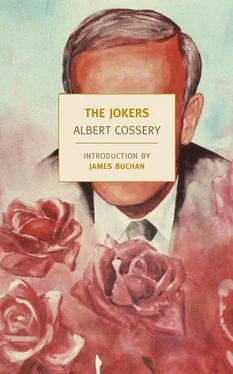Young Zarta’s lousy manners were fully on display as he spat seed shells onto the classroom floor. This was too filthy for Urfy, who did the cleaning. It was time to intervene. In a quiet but firm voice, he said:
“Hey, kid! Go chew your seeds out on the street.”
Zarta swallowed the seed he’d just crushed in his teeth and pretended to study the route of a fly that was circulating near the ceiling. Urfy took the ruler that hung from his desk and pointed it at the child.
“Hey, Zarta! I’m talking to you.”
Seeing that he’d been found out, Zarta began to whimper — a pathetic sound that didn’t fit his body, which resembled a well-fed pig. Zarta ate rapturously; he ate everything he could get his hands on, and by now he’d acquired a robust corpulence unusual for his age. He rose to respond.
“On the street, sir! In this heat! Do you want me to die?”
“Couldn’t care less. Go on, scram!”
“But I was hungry, sir! I haven’t eaten in three days.”
“May Allah protect you,” said Urfy, bowing his head. “What would we do without you and your lies? But, sadly, you’ll be leaving us soon; you’re almost a man.”
This insinuation by his schoolmaster struck Zarta as the ultimate betrayal. Trembling, he clutched at his stomach as if to quell an all-consuming hunger. He appeared to speak through tears:
“Why do you humiliate me, sir? What have I done to deserve this?”
The few students who’d been copying words from the board into their notebooks abandoned their noble endeavor; the rest woke up, yawning, and observed their classmate, who — proud of being singled out by the schoolmaster — groaned for appearance’s sake and tried to look as hungry as possible.
“I’ll tell you why you’ll be leaving us,” Urfy explained calmly. “First, because you’re becoming fatter and fatter; second, because you lie like a rich man. It’s distracting to have someone like you among us. Your lies are worth nothing here — it’s time to go share them with the world. And now, stop gnawing those seeds. Go to sleep like your friends!”
“I’m not tired,” whimpered Zarta, deeply upset at the prospect of leaving school. “But I promise to stop eating seeds. You’ve spoiled my appetite, sir!”
“Let’s hope it’s for good,” said Urfy.
Some of the students began to reproach Zarta for having woken them for nothing; then they demanded fiercely that he share his seeds. It was turning into a bad scene. Urfy put a stop to this nascent offensive by pronouncing the magic formula he reserved for such cases:
“If you don’t calm down, I’m going to kick you all out and close down the school!”
This threat, like a death sentence, produced the desired effect. Instantly the class fell silent, and Urfy was able to return to his text. He’d already finished, but he was enjoying fiddling with it, prettying up the sentences with outlandish adjectives and turns of phrase. Printed and posted on the city’s walls, it would be worse than a price on the governor’s head. Urfy was keenly sensitive to the subtlety of Heykal’s maneuver: to put the terrible weapon of irony in the service of the revolution. Urfy acknowledged the power of irony and scorn. But for the last few months, an open wound in his heart had clouded his customary lucidity. He suffered from a pain that no dose of irony could alleviate: his mother had gone mad, becoming a caricature of a human being. He could not bring himself — dutiful son that he was — to appreciate the absurdity of this scary apparition, who, as a woman and mother, had been all sweetness and self-sacrifice. What good did it do to deny it? But seeing her now — the decrepit body, the pathetic face that seemed to sink deeper into darkness every day — he couldn’t muster a laugh; he had no right. At some moments he gave up completely, relinquished the privilege of insight and fell back into the tormenting chaos that, from the beginning of time, has been pitted against it. Soon suffering would devour him whole. He’d lose his sense of humor, succumb to pessimism and unhappiness, and end up a truly miserable man, unable to teach the children he loved so much. He felt that he was betraying not just his own sensibility but also Heykal and his jovial crew. Because Heykal, though he maintained a strict silence on the subject, was not fooled. Nothing escaped the gentle authority of his gaze; it stripped away the useless trappings of the soul and enveloped it with proud love. There was no doubt in Urfy’s mind: Heykal would have liked him to make a joke of his mother’s madness. He was waiting, patient as the devil, for his friend to offer him this supreme proof; he anticipated it as a prodigious honor, a higher satisfaction. Why be upset, he seemed to be saying. Doesn’t madness make the world go round? Whenever Urfy met Heykal he felt ashamed, like a traitor who knows he’s been found out. It was ridiculous and demeaning, and it left Heykal looking brotherly and kind while Urfy sank into cruel confusion.
Footsteps resounded in the corridor and Urfy looked toward the back of the classroom. For a few seconds he remained frozen in an anxious state of expectation, dreading the inevitable appearance of his mother. But when he saw Karim instead, he smiled, relieved. The young man responded to his smile with a gesture that indicated he didn’t want to disturb him and would wait to speak to him after class. Then, to be discreet, he tiptoed toward a school bench and sat down next to a young girl, whose red-tinted hair and orange dress made her look like an exotic fruit. She was very beautiful, and Karim liked to flirt with her.
The girl kept her eyes down and pretended not to notice his presence. Karim stroked her hair. He leaned in and murmured passionately in her ear:
“So, my love! Shall we give each other instructions?”
The girl didn’t respond. Pouting, she turned her head as if a fly was bothering her.
“What is it?” Karim asked. “Are you breaking up with me or what? Answer me, oh my love!”
Without turning to him the girl said in a low and musical voice:
“Where are the presents you keep promising me, you liar?”
“Women!” lamented Karim with mock indignation. “Always so materialistic! And I thought you loved me for myself. Oh, how unhappy I am!”
He leaned on the desk, resting his forehead in his hand, and let out a series of deep sighs, all the while peering at the girl out of the corner of his eye. He waited to see what would happen. It didn’t take long.
He felt the girl move, then touch his arm.
“But, I love you,” she said in a whisper.
Karim silently rejoiced. Games of love like this made him happy. Whether they were seven or seventy, women always fell for the same tricks. Age didn’t matter; you seduced them all the same way. He stroked the girl’s hair lightly, a tender gesture of reconciliation, and looked around the class. How marvelous to be sitting at a school desk again: suddenly he felt the desire to act like a student. He grabbed the girl’s notebook and, writing meticulously, began to translate a popular proverb about human ingratitude: “We are the ones who taught them to beg, and now they beat us to our own benefactors’ doors.” Karim copied the sentence several times, as devoted as a star student. He’d forgotten his age and the absurdity of his presence here. All he wanted was to shine. The girl watched him, captivated; she’d never seen such a serious student.
There was still a quarter of an hour left before the end of class, but Urfy cut the session short.
“All right, children, be off!”
“But it’s not time yet, sir!” protested several students, waking up with a jolt.
“No protests,” interrupted Urfy. “I’ve seen enough of you for today.”
Читать дальше












